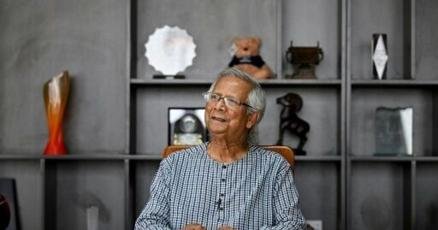Paris: Since the first day of Paris’s bid for the 2024 Olympics, the city has received advice from a respected advisor: Nobel Peace Prize laureate and social entrepreneur Mohamed Usunus.
Usunus has pioneered microcredit in its native Bangladesh since the 1970s, helping millions of people out of poverty by providing small loans to entrepreneurs to help them run their businesses.
His role in Paris as a consultant and ambassador for corporate responsibility is a departure from his usual work and is even more surprising given that the Olympics have undertaken mega-projects with corporate sponsorship.
The 84-year-old admits he is not a sports fan, but agreed to ride in 2016 after Paris Socialist Mayor Anne Hidalgo hosted a dinner with him and his team because he wanted to host.
“The simplest thing you can do before you make a financial allocation decision,” says Fundsus, does it have a social purpose? “Ask,” he said.
“If not, you don’t have to spend a penny,” he said.
He said he saw another opportunity to harness the power of the Olympics, but to spread the word about the importance of using new ways of doing things aimed at solving humanity’s problems.
Usunus said, the ideas of the city hall and the organizing committee are suitable, considering that the 33rd summer game of the city will have a lower budget and environmental impact compared to the previous edition.
Apart from the athletes’ village, only two new sports fields were built.
The high-rise complex on the outskirts of the city for the 2016 Olympic Games in Rio de Janeiro is aware of this challenge, looking at a village with no public transport connections.
Instead, the village of Paris 2024 is about 40 low-rise blocks on a brownfield site in one of the poorest areas north of Paris, with new metro lines, schools and parks as part of the development plan.
A third of the 2,800 apartments will be converted into social housing after the Olympics and Paralympics finish in September.
The proposal also calls for the committee to include “recipes for social enterprises” in public tenders for services such as canteens.
“All the big companies that won these contests read this line and talk to each other and ask: What is social work? Are we wrong? Are we prioritizing?” he said.
“He would say. So at least you’ll be photographing them.”
Finally, the French multinational Sodexo, with annual sales of more than 12 billion euros ($13 billion), won the contract to provide 40,000 meals a day.
But around, one can see the desire to use the Games to nurture small and community-minded companies, even if only a fraction of the £9 billion budget is used.
Paris-based plastic recycling company Le Pave won the contract to supply 11,000 seats at the new Olympic venue, one of about 500 “public companies” to win tenders.
Others include a project that turns construction waste used in the athletes’ village into soil. Laundry services will be provided by a consortium of nine local businesses.
At the Games construction site, contractors are required to use long-term unemployment for at least 10 percent of their workforce.
Usunus does not seek credit for any of these initiatives, but believes that it is encouraging change by putting its ideas and reputation at the service of the Games.
Milan-Cortina, Italy’s host of the 2026 Winter Olympics, has begun consultations.
“They whispered in my ear, ‘We want to do better than Paris.’





















